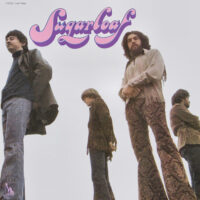
Cheap-heat alert! You’ve probably passed over this ubiquitous bargain-bin dweller by Denver band Sugarloaf more times than you care to count. But please reconsider. I copped mine for a buck years ago, and I’m happy to report that I got way more than expected from these two-hit wonders.
Sugarloaf’s debut album peaked at #24 in the US, thanks largely to its hit single, “Green-Eyed Lady,” which reached #3 in the singles chart. After an instantly magnetic intro featuring Bob Webber’s luminous guitar wails and Bob Raymond’s bubbly, bulbous bass line, things excitingly change for the duration of the song’s 6:50. Allegedly, the suspenseful main riff derived from a scale exercise in a music-theory book. Works for me. As paeans to emerald-orbed girlfriends go, this is unsurpassable. It’s a minor miracle that radio lavished so much love on such a non-LCD, unconventionally structured jazz-rock opus—although the Doors kind of, uh, opened the door for such airplay largesse. Whatever the case, those were different times.
Next, Sugarloaf turn in a suitably turbulent cover of the Yardbirds potent blues-rock warhorse, “The Train Kept A-Rollin’ (Stroll On).” Another zenith occurs on “Bach Doors Man/Chest Fever.” It opens with a momentous classical-music overture that will curl the toes of Iron Butterfly fans. This then segues smoothly into a grandiose rendition of the Band’s greatest song, “Chest Fever” (nobody can compete with Richard Manuel on the mic, so the decision to go instrumental makes sense.) Sugarloaf transform the original’s propulsive, proto-house rhythm into a staccato blues-rock behemoth full of swirling organ, trenchant guitar stabs, and wicked bass ostinatos, while drummer Myron Pollock gets baroquely funky. It’s a complex banger, for damn certain.
Now, a lot of critics have dismissed side two of Sugarloaf, but “West Of Tomorrow” is a striking bit of musicianship. The track boasts the sky-punching air of a Guess Who hit (partially due to singer Veeder van Dorn’s vocal resemblance to Burton Cummings), but it’s more progtastic than those Canadians, with its intricate beats and dynamic interplay among Webber’s guitar, Jerry Corbetta’s keys, and Raymond’s bass.
After this song, though, the record flags. “Gold And The Blues” is trudging (not walking) blues with plenty of guitar fireworks, but ultimately it sounds like flashy filler. There’s no good reason for it to last more than seven minutes. Last comes “Things Gonna Change Some,” middling waltz-time rock with fruity vocals by van Dorn. There’s an urgency here, but overall the effect is not gripping, although Corbetta breaks off a vibrant piano solo in the last minute.
Sugarloaf‘s hit/miss ratio is 66.6%, which is higher than that of many pricier albums. Stop riffling past this one. -Buckley Mayfield
Located in Seattle’s Fremont neighborhood, Jive Time is always looking to buy your unwanted records (provided they are in good condition) or offer credit for trade. We also buy record collections.


